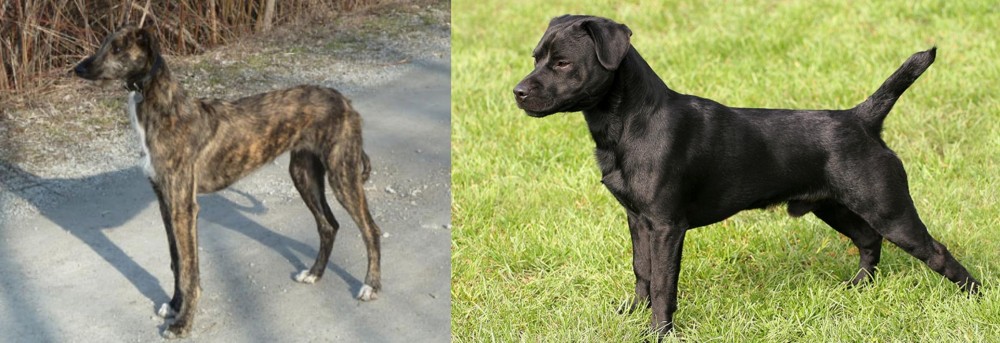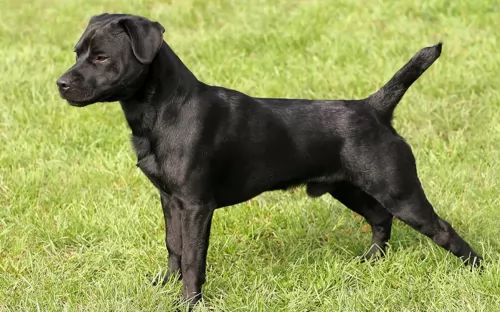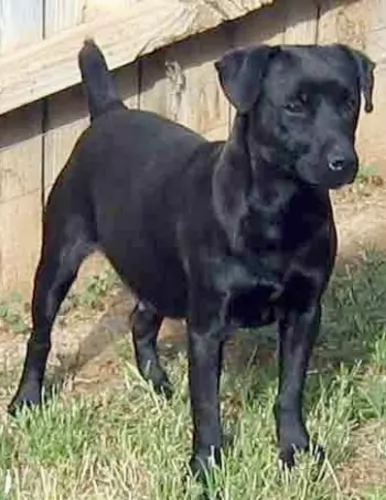 Petzlover
Petzlover American Staghound is originated from United States but Patterdale Terrier is originated from United Kingdom. American Staghound may grow 37 cm / 15 inches higher than Patterdale Terrier. American Staghound may weigh 34 kg / 75 pounds more than Patterdale Terrier. Both American Staghound and Patterdale Terrier has almost same life span. Both American Staghound and Patterdale Terrier has same litter size. Both American Staghound and Patterdale Terrier requires Low Maintenance.
American Staghound is originated from United States but Patterdale Terrier is originated from United Kingdom. American Staghound may grow 37 cm / 15 inches higher than Patterdale Terrier. American Staghound may weigh 34 kg / 75 pounds more than Patterdale Terrier. Both American Staghound and Patterdale Terrier has almost same life span. Both American Staghound and Patterdale Terrier has same litter size. Both American Staghound and Patterdale Terrier requires Low Maintenance.
 The American Staghound is hunting dog and type of sighthound that is not recognized as a separate breed. They have historically been bred to hunt coyotes and then other game. Even though they are not considered a separate breed some of their breeding lines have existed much longer than some officially recognized breeds. The American Staghound is a cross between the Greyhound and the Scottish Deerhound. There was probably some Borzoi mixed in as well. The Staghound is believed to have traveled with General Custer across the American West.
The breed is a long-legged running dog with the speed of a Greyhound, the sighting ability of sight hounds and more endurance than any running breed. They are incredible athletes with amazing agility and have been bred to course game – coyotes mostly – and therefore are bred with a very intense prey drive. In the past they chased stags and deer and today they chase coyotes and hare. Coyotes are much faster than wolves and fight just as hard. The American Staghound is the only breed fast enough to track down the coyote. However, the breed is not recognized by the AKC.
Hunting with an American Staghound today is not very different from hunting with them in medieval times. Strict breeding practices and the non-commercialization of the breed has led to the almost perfect preservation of this hunting breed. They have not changed very much over the centuries. They have been breeding Staghound to Staghound since the early 1800’s. At times very, good hunting dogs from Greyhound and Deerhound stock are added to the mix. For hundreds of years now the closed breeding has led to what might be the finest coyote chasing sighthound possible.
The American Staghound is hunting dog and type of sighthound that is not recognized as a separate breed. They have historically been bred to hunt coyotes and then other game. Even though they are not considered a separate breed some of their breeding lines have existed much longer than some officially recognized breeds. The American Staghound is a cross between the Greyhound and the Scottish Deerhound. There was probably some Borzoi mixed in as well. The Staghound is believed to have traveled with General Custer across the American West.
The breed is a long-legged running dog with the speed of a Greyhound, the sighting ability of sight hounds and more endurance than any running breed. They are incredible athletes with amazing agility and have been bred to course game – coyotes mostly – and therefore are bred with a very intense prey drive. In the past they chased stags and deer and today they chase coyotes and hare. Coyotes are much faster than wolves and fight just as hard. The American Staghound is the only breed fast enough to track down the coyote. However, the breed is not recognized by the AKC.
Hunting with an American Staghound today is not very different from hunting with them in medieval times. Strict breeding practices and the non-commercialization of the breed has led to the almost perfect preservation of this hunting breed. They have not changed very much over the centuries. They have been breeding Staghound to Staghound since the early 1800’s. At times very, good hunting dogs from Greyhound and Deerhound stock are added to the mix. For hundreds of years now the closed breeding has led to what might be the finest coyote chasing sighthound possible.
 The Patterdale was developed in England,with his origins being linked to an early breeder with the name Joe Bowman.
The Patterdale was developed in England,with his origins being linked to an early breeder with the name Joe Bowman.
They were sought after for their prowess at guarding sheep from foxes. The dog was recognized by the United Kennel Club in 1995. It is believed the dog is descended from the Northern terrier breeds and can be traced far back.
 When you look at the American Staghound you can clearly see the Scottish Deerhound and the Greyhound lines. They have strong running muscles in their long legs and deep chest. He is of course a sight hound, so his vision is acute.
His running endurance is second to none. It is this endurance in running all day that makes the American Staghound difference from the Scottish Deerhound and the Greyhound. Yes, both the Deerhound are greyhound are great runners, but the American Staghound runs just as fast with an endurance level ten times that of the other hounds. His heavy bones structure and thick skin are also different from the other racing fast sight hounds.
When you look at the American Staghound you can clearly see the Scottish Deerhound and the Greyhound lines. They have strong running muscles in their long legs and deep chest. He is of course a sight hound, so his vision is acute.
His running endurance is second to none. It is this endurance in running all day that makes the American Staghound difference from the Scottish Deerhound and the Greyhound. Yes, both the Deerhound are greyhound are great runners, but the American Staghound runs just as fast with an endurance level ten times that of the other hounds. His heavy bones structure and thick skin are also different from the other racing fast sight hounds.
 The Patterdale Terrier is a small sized dog that stands at between 25 and 40 cm in height and weighs 5 to 7kg.
The Patterdale Terrier is a small sized dog that stands at between 25 and 40 cm in height and weighs 5 to 7kg.
The coat of the dog can be smooth, broken or rough, but all coats are double and weatherproof. Colors include red, liver, black, bronze, black and tan or chocolate and sometimes brindle. The ears are floppy and medium length and the tail is also medium length and held high, curving slightly. It used to be docked and then ¼ to 1/3 of the tail was removed.
The Patterdale Terrier is small but he is bold and confident and very energetic. He will certainly need to be in a household where the family members are active, busy people. Because he is strong-willed he will benefit from training and socialization which will make him obedient and able to behave well in different situations.
 This dog was bred to run fast and long after something it sees. They are not considered hyperactive but won’t live well in a confined space such as an apartment or condo. You will need a single-family house with a large yard. Though they are affectionate, family dogs, they are not cut out to be guard dogs. They are not especially protective or territorial, though they may bark at what they can see in the distance.
They are calm in their homes if exercised enough and great with children. They are often gentle and loving. They are pack oriented and accept other dogs, but they are not welcoming toward cats or other prey sized animals. Be careful with the AS around small children as he might knock them down or see them as prey as well. They consider anything smaller that runs to be prey.
When chasing prey, they are not only fast and enduring, they are tenacious and courageous. Remember that this is a breed that has been bred true in order to hunt and only in order to hunt. Their hunting instincts will override almost any other. Over the centuries only the best hunters were allowed to be bred so that only the best hunters would be born.
This dog was bred to run fast and long after something it sees. They are not considered hyperactive but won’t live well in a confined space such as an apartment or condo. You will need a single-family house with a large yard. Though they are affectionate, family dogs, they are not cut out to be guard dogs. They are not especially protective or territorial, though they may bark at what they can see in the distance.
They are calm in their homes if exercised enough and great with children. They are often gentle and loving. They are pack oriented and accept other dogs, but they are not welcoming toward cats or other prey sized animals. Be careful with the AS around small children as he might knock them down or see them as prey as well. They consider anything smaller that runs to be prey.
When chasing prey, they are not only fast and enduring, they are tenacious and courageous. Remember that this is a breed that has been bred true in order to hunt and only in order to hunt. Their hunting instincts will override almost any other. Over the centuries only the best hunters were allowed to be bred so that only the best hunters would be born.
 Intelligent, courageous and feisty, the Patterdale Terrier is a dog that will get on well with everyone in the house. Those who are active and outdoor types will be the best kind of dog owners for this active, energetic dog.
Intelligent, courageous and feisty, the Patterdale Terrier is a dog that will get on well with everyone in the house. Those who are active and outdoor types will be the best kind of dog owners for this active, energetic dog.
The Patterdale is confident and strong willed and will do superbly well with some training and socialization. With lots of love and care, your Patterdale Terrier can make you an excellent family pet and companion.
 The American Staghound has been bred so consistently within the breed and true that they exhibit very few health problems. All running dogs are susceptible to joint issues, but the Staghound has less than most. Two issues they do face more often are a problem with anesthesia if they ever need it and the propensity to be vulnerable to bloat. Since they are a centuries old hybrid there are no real health issues born of genetics.
The American Staghound has been bred so consistently within the breed and true that they exhibit very few health problems. All running dogs are susceptible to joint issues, but the Staghound has less than most. Two issues they do face more often are a problem with anesthesia if they ever need it and the propensity to be vulnerable to bloat. Since they are a centuries old hybrid there are no real health issues born of genetics.
 The good news is that terriers have few health problems and they can live to a ripe age. Just like other dogs, they can also battle with some of the common dog ailments there are.
The good news is that terriers have few health problems and they can live to a ripe age. Just like other dogs, they can also battle with some of the common dog ailments there are.
Most allergens are foods, medicines or insects and exposure to the allergen can cause an over-reaction. In a dog, the most common symptom associated with allergies is itching of the skin. It can drive your pet mad as he licks and bites his skin. The symptoms of allergies can involve the respiratory system and he will have coughing and sneezing or even a discharge from the eyes.
Your Patterdales can also develop cataracts and glaucoma – two kinds of eye diseases. Glaucoma can unfortunately lead to blindness but something can be done if you recognize the signs. There are 2 main types of canine glaucoma, characterized by pressure inside the eye which can do damage to the retina and optic nerve – primary- and secondary glaucoma. Your vet will try to determine whether your pet has primary or secondary glaucoma to determine treatment.
 It is important that you don’t ever over feed you American Staghound as they are thin and bred to run. Even though they are heavier boned than their closest relatives, they are still very susceptible to obesity if overfed. The adult AS should be fed about 4-6 cups of dry food every day in at least 2 meals but 3 of more would be better. This will prevent bloat.
It is important that you don’t ever over feed you American Staghound as they are thin and bred to run. Even though they are heavier boned than their closest relatives, they are still very susceptible to obesity if overfed. The adult AS should be fed about 4-6 cups of dry food every day in at least 2 meals but 3 of more would be better. This will prevent bloat.
As previously mentioned there are no genetic issues with the health of the American Staghound. Bred for one reason and one reason alone for many centuries has led to this healthy state. Also, as stated previously they can have issues with bloat and anesthesia. The issue with anesthesia comes from the fact that the American Staghound has very little body fat to muscle ration. The issue with bloat or torsion can be avoided with many smaller meals and not running your Staghound right after they eat a large meal.
Of course, the American Staghound loves to run and if you are not going to hunt with her, you will have to find another source of vigorous physical activity. Every day from puppyhood on the AS must be stimulated mentally and physically in order to grow and mature correctly. He must have a home where the freedom to run is an everyday experience, not a dog park once a week. If you ride bikes, race walk or run on a daily basis this might be the dog for you. They obviously excel at games like lure coursing and can be good at agility.
 Your Patterdale Terrier has a lot of energy, so as a responsible dog owner, you will need to see that he is exercised properly. This will include a walk every day as well as spending time throwing balls or a frisbee for him. He is a working breed and has been used to being mentally and physically stimulated.
Your Patterdale Terrier has a lot of energy, so as a responsible dog owner, you will need to see that he is exercised properly. This will include a walk every day as well as spending time throwing balls or a frisbee for him. He is a working breed and has been used to being mentally and physically stimulated.
The Patterdale Terrier isn’t a high maintenance dog and his coat will simply require a brush twice a week. Your pet can’t tell you about any pain he is experiencing so you will need to watch his body language.
Dogs can easily pick up an ear infection and this can be very painful. When you brush your pet, check inside his ears for signs of redness and discharge and check inside his mouth to see if you can spot any rotten teeth. Bad teeth can wreak havoc on his health. Keep the nails trimmed.
If you intend feeding your pet commercially manufactured food, good and well because it is a convenient way to feed your pet, but make sure its a quality food. This will ensure your dog is getting in the right amount of vitamins and minerals.
To vary his diet just a bit, provide him with some home-made food such as boiled chicken, brown rice or pasta, and some wholesome vegetables such as carrots, spinach and sweet potato. Dogs love the simplicity and nutritional value of food like this, and they don't have to worry about getting a stomach ache from strange foods. Try and include some raw meat into the kibble from time to time as well.
Never leave your Paatterdale Terrier without a constant supply of fresh cool water.